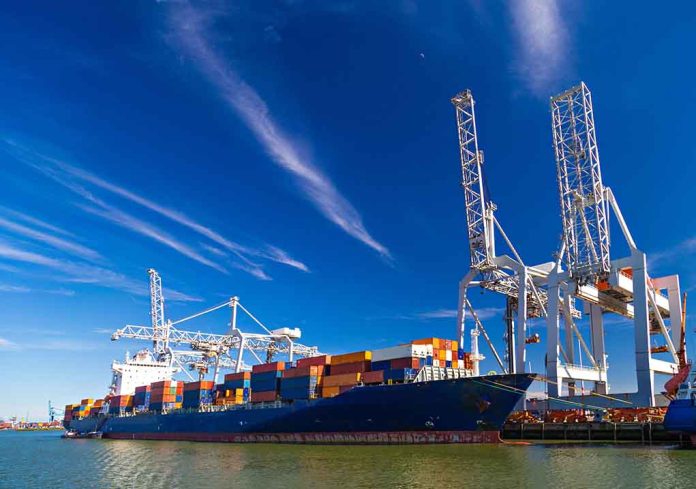
At a Glance
- About 45,000 dockworkers on the U.S. East and Gulf Coasts are threatening to strike on Oct. 1.
- The International Longshoremen’s Union demands higher wages and a ban on port automation.
- A prolonged strike could result in shortages of consumer products and cost the economy $7.5 billion per week.
- The union and the United States Maritime Alliance haven’t negotiated since June.
- President Biden is not expected to intervene before the Nov. 5 presidential election.
Potential Strike Impact
Approximately 45,000 dockworkers along the U.S. East and Gulf Coasts, represented by the International Longshoremen’s Association (ILA), are poised to strike on October 1. This potential strike, coming after failed contract negotiations with the United States Maritime Alliance, could paralyze port operations handling about half the country’s cargo. The interruption would mainly affect imports and exports of perishable goods like fruits, leading to shortages and higher prices. A disruption of this magnitude could severely harm the U.S. economy, with losses estimated at $7.5 billion per week.
The dockworkers are demanding significant pay raises, almost 80% over six years, and stringent restrictions on port automation. Union president Harold Daggett emphasized, “We will shut them down Oct. 1 if we don’t get the kind of wages we deserve.” The workers are opposing the automation of cranes, gates, and container movements, fearing job losses despite mixed study results on automation’s impact. The Maritime Alliance offered to maintain clauses preventing fully automated terminals, but that hasn’t appeased the workers.
America could run out of popular fruit within weeks as 45,000 dockworkers who help import it threaten to strike https://t.co/W7pK6Bvsys pic.twitter.com/t5PEBrTGBW
— Daily Mail US (@DailyMail) September 23, 2024
Economic and Social Repercussions
A strike could lead to immediate shortages of essential items. While a short strike might not cause major disruptions, a prolonged walkout could lead to empty shelves and even spoilage of perishable goods like fruits and meats. As explained by Kopke from the Daily Mail, “Any fruit that arrives after Oct. 1 will be condemned to the trash can.” This potential scenario has alarmed businesses and consumers alike.
“A strike at this point in time would have a devastating impact on the economy,” warned a coalition of 177 trade groups in a letter to President Joe Biden. Many observers are particularly concerned about the timing, as the strike looms just one month before the presidential election, further complicating the political landscape. Analysts argue that the union’s demands could leverage the political climate to their advantage.
A possible strike by 45,000 dockworkers at major ports along the U.S. East and Gulf coasts threatens to cause significant supply-chain disruptions just weeks before the election, Bloomberg reports.
Labor talks have stalled, with workers prepared to strike starting Oct. 1.
— Pro Farmer (@profarmer) September 23, 2024
Current Status and Future Projections
Despite the urgency, the union and the United States Maritime Alliance haven’t been at the bargaining table since June, with no further talks scheduled. Both parties have expressed a desire to avoid a strike, yet time is running out. “We want to bargain and avoid a strike, but time is running out if the ILA is unwilling to return to the table,” stressed the USMX.
The increasing tension between the ILA and the Maritime Alliance has caused widespread anxiety. “I think everyone’s a bit nervous about it,” said Mia Ginter, director of North America ocean shipping for C.H. Robinson, highlighting the unprecedented rhetoric this time around. If not addressed swiftly, the strike could trigger significant economic instability and logistical headaches that might extend beyond the ports to other industries, such as auto and pharmaceuticals.
Dockworkers at key U.S. ports threatening strike consumers could feel https://t.co/w0D09npigY
— CBS Evening News (@CBSEveningNews) September 18, 2024
Sources:
Dockworkers at key U.S. ports threatening strike consumers could feel
Is bananageddon ahead? US ports threatened with strikes could stall fruit, auto supplies
Looming Port Strike Threatens to Cripple East Coast Supply Chains
More inflation: A looming strike threatens to drive supply down and prices up
US Supply Chain Risks Escalate With Potential 45,000-Strong Dockworker Strike
Port officials brace for potential strike by dockworkers along the East Coast
East Coast Ports Hit Speed Bump in Fast-Track Labor Talks













